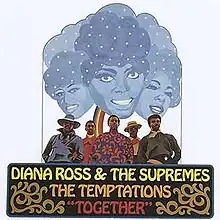| Together | ||||
|---|---|---|---|---|
 Original LP cover | ||||
| Studio album by | ||||
| Released | September 23, 1969 | |||
| Recorded | 1969 | |||
| Genre | Pop, soul | |||
| Label | Motown | |||
| Producer | Frank Wilson, Smokey Robinson, Al Clevland, Terry Johnson, Tom Baird, Henry Cosby, Deke Richards | |||
| Diana Ross & the Supremes chronology | ||||
| ||||
| The Temptations chronology | ||||
| ||||
| Alternative cover | ||||
 The original American LP for Together has a cover which folds out to reveal a full illustration of The Supremes and the Temptations. The full artwork was also used for some international versions of the album without requiring the cover to be unfolded. | ||||
| Singles from Together | ||||
Together, released by Motown in 1969 (catalog number MS 692), was the second and final duets studio album combining Diana Ross & the Supremes and The Temptations into an eight-person Motown act. Like the first duets LP, Diana Ross & the Supremes Join The Temptations, it is composed almost entirely of covers, including versions of The Band's "The Weight", Sly & the Family Stone's "Sing a Simple Song", Frankie Valli's "Can't Take My Eyes Off You" (featuring Mary Wilson leading, in preparation for Ross' departure from the Supremes) and Motown songs like "Ain't Nothing Like the Real Thing" and "Uptight (Everything's Alright)". "The Weight" was the only single in the US, and failed to make it into the American Top 40. "Why (Must We Fall in Love)", a UK exclusive single, was a Top 40 hit on the UK singles charts.
Together was released on the same day (September 23, 1969) as Puzzle People, a regular Temptations album showcasing the group's then-current psychedelic soul sound.
| Review scores | |
|---|---|
| Source | Rating |
| Allmusic | |
Track listing
| No. | Title | Writer(s) | Lead singers | Length |
|---|---|---|---|---|
| 1. | "Stubborn Kind of Fellow" |
| 3:10 | |
| 2. | "I'll Be Doggone" |
| 3:32 | |
| 3. | "The Weight" | Robbie Robertson |
| 3:02 |
| 4. | "Ain't Nothing Like the Real Thing" |
| 2:44 | |
| 5. | "Uptight (Everything's Alright)" |
| 3:05 | |
| 6. | "Sing a Simple Song" | Sly Stone |
| 3:33 |
| 7. | "My Guy / My Girl" (Medley) |
|
| 3:13 |
| 8. | "For Better or Worse" |
|
| 2:37 |
| 9. | "Can't Take My Eyes Off You" |
| 3:11 | |
| 10. | "Why (Must We Fall in Love)" |
| 3:05 |
Personnel
- Diana Ross – vocals
- Mary Wilson – vocals
- Cindy Birdsong – vocals
- Dennis Edwards – vocals
- Eddie Kendricks – vocals
- Paul Williams – vocals
- Melvin Franklin – vocals
- Otis Williams – vocals
- The Andantes – additional background vocals
- Frank Wilson – producer, executive producer
- Smokey Robinson – producer
- Al Clevland – producer
- Terry Johnson – producer
- Tom Baird – producer/arranger
- Various Los Angeles area session musicians – instrumentation
Charts
| Chart (1969) | Peak position |
|---|---|
| Canada Top Albums/CDs (RPM)[2] | 29 |
| UK Albums (OCC)[3] | 28 |
| UK R&B Albums (Record Mirror)[4] | 4 |
| US Billboard 200[5] | 28 |
| US Top R&B/Hip-Hop Albums (Billboard)[6] | 6 |
References
- ↑ Kik, Quink. Together at Allmusic
- ↑ "Top RPM Albums: Issue 6050". RPM. Library and Archives Canada. Retrieved 1 January 2020.
- ↑ "The Supremes | Artist | Official Charts". UK Albums Chart. Retrieved 1 January 2020.
- ↑ "R'N'B ALBUMS" (PDF). Record Mirror. February 14, 1970. p. 15. Retrieved October 31, 2021 – via worldradiohistory.com.
- ↑ "The Supremes Chart History (Billboard 200)". Billboard. Retrieved 1 January 2020.
- ↑ "The Supremes Chart History (Top R&B/Hip-Hop Albums)". Billboard. Retrieved 1 January 2020.